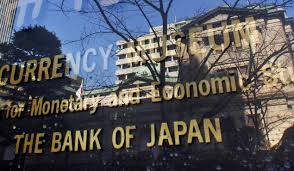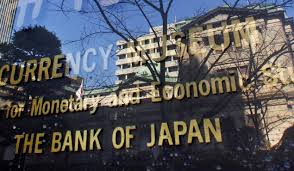
Stunning investors with another bold move to revive the economy as volatile markets and slowing global growth threaten its efforts to beat deflation, the Bank of Japan unexpectedly cut a benchmark interest rate below zero on Friday.
In an aggressive policy pioneered by the European Central Bank, the BOJ said it would charge for a portion of bank reserves parked with the institution. This announcement was followed by a jump of Asian shares jumped, the tumbling of the yen and rally of sovereign bonds.
"The BOJ will cut the interest rate further into negative territory if judged as necessary," the bank said in a statement announcing the decision.
Since the 1990s have discouraged consumers from buying big or frequently because prices tend to fall due to the deflation or widespread falling prices. The negative interest is seen as Japan adopting a new weapon in its long battle against deflation. Deflation is seen as the root of two decades of economic malaise.
The underlying price trend is rising steadily and the world's third-biggest economy is recovering moderately said the BOJ Governor Haruhiko Kuroda.
"But there's a risk recent further falls in oil prices, uncertainty over emerging economies, including China, and global market instability could hurt business confidence and delay the eradication of people's deflationary mindset," Kuroda added.
"The Bank of Japan decided to adopt negative interest rates ... to forestall such risks from materialising," he told a news conference after the decision.
The bank was not thinking of adopting a negative interest rate policy for now, Kuroda had said as recently as last week. Further easing would likely take the form of an expansion of its massive asset-buying programme he had told the Japanese parliament.
However a 0.1 percent interest on selected current account deposits that financial institutions hold with it was decided to be taken by the BOJ's policy board in a narrow 5-4 vote.
Reviving the "deflationary mindset" it has been striving to banish with aggressive money printing and forestalling the risk of global financial turbulence hurting business confidence were the two aims of the central bank’s move.
"Kuroda had been saying that he didn't think something like this would help so it is a bit surprising and it's clear the market has been surprised by it," said Nicholas Smith, a strategist at CLSA based in Tokyo.
The European Central Bank became the first major central bank to venture into negative territory in June 2014 followed by several European central banks who have cut key rates below zero.
The central bank hopes banks will step up lending to support activity in the real economy, rather than pay a penalty to deposit excess cash at the BOJ after the adoption of a negative interest rate by BOJ.
However any money released into the system may merely be hoarded or steered into speculative activity such as betting on stocks as there is little sign of any pent-up demand from Japanese banks or cash-rich companies for fresh funds.
"This is an aggressive all-stick-no-carrot approach to spurring investment, as depositors are essentially penalized for holding cash," said Martin King, co-managing director at Tyton Capital Advisors in Tokyo.
This is the fourth time the BOJ has pushed back its timeframe for hitting its inflation target - from an initial goal of around March 2015.
(Source:www.reuters.com)
In an aggressive policy pioneered by the European Central Bank, the BOJ said it would charge for a portion of bank reserves parked with the institution. This announcement was followed by a jump of Asian shares jumped, the tumbling of the yen and rally of sovereign bonds.
"The BOJ will cut the interest rate further into negative territory if judged as necessary," the bank said in a statement announcing the decision.
Since the 1990s have discouraged consumers from buying big or frequently because prices tend to fall due to the deflation or widespread falling prices. The negative interest is seen as Japan adopting a new weapon in its long battle against deflation. Deflation is seen as the root of two decades of economic malaise.
The underlying price trend is rising steadily and the world's third-biggest economy is recovering moderately said the BOJ Governor Haruhiko Kuroda.
"But there's a risk recent further falls in oil prices, uncertainty over emerging economies, including China, and global market instability could hurt business confidence and delay the eradication of people's deflationary mindset," Kuroda added.
"The Bank of Japan decided to adopt negative interest rates ... to forestall such risks from materialising," he told a news conference after the decision.
The bank was not thinking of adopting a negative interest rate policy for now, Kuroda had said as recently as last week. Further easing would likely take the form of an expansion of its massive asset-buying programme he had told the Japanese parliament.
However a 0.1 percent interest on selected current account deposits that financial institutions hold with it was decided to be taken by the BOJ's policy board in a narrow 5-4 vote.
Reviving the "deflationary mindset" it has been striving to banish with aggressive money printing and forestalling the risk of global financial turbulence hurting business confidence were the two aims of the central bank’s move.
"Kuroda had been saying that he didn't think something like this would help so it is a bit surprising and it's clear the market has been surprised by it," said Nicholas Smith, a strategist at CLSA based in Tokyo.
The European Central Bank became the first major central bank to venture into negative territory in June 2014 followed by several European central banks who have cut key rates below zero.
The central bank hopes banks will step up lending to support activity in the real economy, rather than pay a penalty to deposit excess cash at the BOJ after the adoption of a negative interest rate by BOJ.
However any money released into the system may merely be hoarded or steered into speculative activity such as betting on stocks as there is little sign of any pent-up demand from Japanese banks or cash-rich companies for fresh funds.
"This is an aggressive all-stick-no-carrot approach to spurring investment, as depositors are essentially penalized for holding cash," said Martin King, co-managing director at Tyton Capital Advisors in Tokyo.
This is the fourth time the BOJ has pushed back its timeframe for hitting its inflation target - from an initial goal of around March 2015.
(Source:www.reuters.com)





